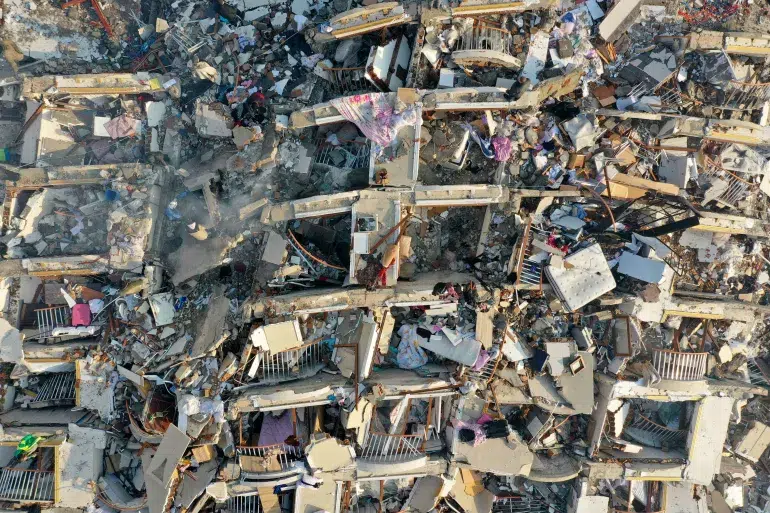Most insurance payouts due to the earthquake that tragically hit Turkiye and Syria will ultimately be borne by global reinsurers. The earthquake and a series of aftershocks struck southern and central Turkiye and western Syria on 6 February.
It had a maximum magnitude of at least 7.8 and was the most severe earthquake in the region since 1999. This is first and foremost a human tragedy, which has led to several thousand fatalities and left hundreds of thousands of people homeless.
Economic losses are hard to estimate as the situation is evolving

According to Fitch Ratings, economic losses are hard to estimate as the situation is evolving, but they appear likely to exceed $2 bn and could reach $4 bn or more.
Insured losses will be much lower, perhaps around $1 bn, due to low insurance coverage in the affected regions.
The vast majority of insured losses will be covered by reinsurance, but the amount ceded is likely to be insignificant in the context of the global reinsurance market, with no implications for reinsurers’ ratings.
Insurance coverage is likely to be low in most of the affected parts of Turkiye and Syria. The Turkish Catastrophe Insurance Pool (TCIP) was created after the Izmit earthquake of 1999 to cover earthquake damage to residential buildings in urban areas.
The earthquakes have caused for thousands of buildings to be destroyed, and over 19,000 deaths have been recorded. According to the US Geological Survey, both earthquakes could result in more than $1 bn of losses.
However, it does not cover human losses, liability claims or indirect losses, such as business interruption.
Earthquake insurance cover

Moreover, earthquake insurance cover is technically mandatory in Turkiye, but is very often not enforced in practice. As a result, many residential properties are not insured, particularly in many of the affected areas, where low household incomes constrain affordability.
Earthquake insurance can help pay for some of your losses. This brochure will tell you about earthquake insurance.
Earthquakes will happen, but we do not know exactly when. We do know that they can cause a lot of damage to your home and your belongings. You may even have to move out of your home while it is repaired or rebuilt. Homeowners, renters, and condominium insurance policies do not cover damage from natural disasters such as earthquakes, floods, and landslides.
Insurance coverage in the affected parts of Syria is likely to be similarly low, particularly given the economic effects of the country’s civil war.
The TCIP is heavily reinsured. We estimate that the reinsurance tower provides protection of just over USD2 billion, following the January 2023 reinsurance renewals, with an attachment point of around USD300 million (see 2023 Reinsurance Market Dynamics).
Local and international commercial insurers that provide property and business interruption insurance policies to industrial clients in the region will face claims as factories and infrastructure, including airports and ports, have been severely damaged. Fitch assumes that these covers are also heavily reinsured.
On February 6, 2023, two powerful earthquakes of more than 7.5 magnitude struck near the South-eastern Turkish cities of Gaziantep and Kahramanmaras, the country’s sixth and 18th largest cities.
Analytics do not expect catastrophe bonds to be significantly affected as the earthquake risk they cover in the region is mostly limited to the Istanbul area.
Impact of the two earthquakes for reinsurers

A report from AM Best “Devastating Earthquakes Add to an Already Challenging Operating Environment for (Re)insurers in Türkiye” has highlighted how the impact of the two earthquakes in south-eastern Turkey, adds to what is already a “challenging operating environment” for re/insurers within the country.
While initial information indicates that insurance penetration in the region is relatively low compared to the most populous centres in Western Türkiye, the tremors occurred against a backdrop of a prolonged period of extreme economic turbulence, which the rating agency believes “significantly weakened” the creditworthiness of the local re/insurance market.
Since 2000, earthquake insurance has been compulsory for private dwellings within municipal boundaries in Tukey, and is covered by the national Turkish Catastrophe Insurance Pool.
The TCIP was established in 1999 following an earthquake in Marmara. The TCIP provides building-only earthquake cover for residential property.
Membership of the pool is compulsory for residential property owners, and covers sums assured up to a prescribed level. The policies are distributed by direct insurance companies acting as intermediaries. However, while the policies are compulsory for residential homes, there is no legal penalty for not being covered.
Although AM Best expects outwards reinsurance to partly protect the balance sheets of local (re)insurers from the impact of the recent catastrophes, the tragic events represent yet another headwind for a market already facing an extremely challenging operating environment, characterised by significant inflation and a weakening currency.
AM Best notes that penetration rates vary significantly across the country, and they are lower in the south-eastern regions of the country, where the two recent earthquakes occurred.
According to TCIP’s latest published annual report, it shows that reinsurance cover incepting in 2021 had a lower limit of TRY 5.0 billion ($0.4 billion as at 31 December, 2021) (unchanged from the previous year), while the upper limit stood at TRY 36.9 billion ($3.2 billion) (up from TRY 32.2 billion the previous year).
Reinsurance giants Munich Re and Swiss Re had the highest risk shares in the excess of loss programme, with the remaining capacity understood to be provided by international reinsurers in Europe, the London market and Bermuda.
The latest figures from TCIP shows compulsory earthquake insurance penetration at around 52% in the region most affected by the latest incidents. As a result, the rating agency expects that – as with previous natural disasters in the country – there will be a significant variance between the economic and insured losses from the two earthquakes.

While it is likely that international reinsurance markets will pick up a proportion of the losses, Best states that these events occur at a time where re/insurers in Turkey are facing an extremely challenging operating environment. This is showcased by significant inflation and a weakening currency.
AM Best concludes by estimating that this deterioration of the economic conditions in the country meaningfully increased the asset and underwriting risks of many re/insurers operating within Turkey, weighing on their risk-adjusted capitalisation.
Large gap between economic and insured losses likely

The TCIP does not cover commercial property and earthquake insurance is not compulsory for businesses. However, it is market practice for earthquake cover to be included in policies issued by local (re)insurers.
Fact checked by Oleg Parashchak








